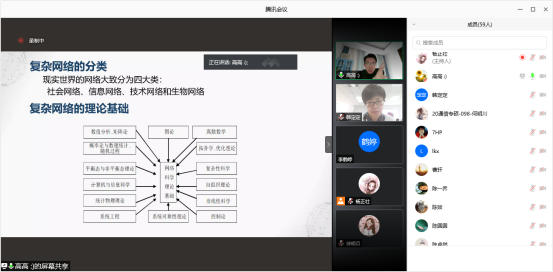On the morning of November 19, 2020, Professor Dingding Han from the Complex Network Science and Intelligent Systems Laboratory invited Professor Dong Gaogao to give an online academic lecture titled "Optimal Topology and Two New Types of Scaling Relations in Network Systems."
Professor Dong Gaogao holds a Ph.D. from Boston University, USA, and is a doctoral supervisor and an outstanding young teacher at universities in Jiangsu Province. His research mainly focuses on complex network theory and applications. He has published over 40 research papers (SCI indexed), with some of his works being included in journals such as PNAS and National Science Review. He has co-authored three monographs.
In his lecture, Professor Dong Gaogao began by discussing the community structure in network systems. Based on percolation theory, he proposed a mathematical framework model to study the resilience of complex networks with community structures. His research found that changes in the proportion of dependent edges and nodes between communities could eliminate continuous phase transitions that occur in single-community networks, thereby stabilizing the system.
Next, he introduced a model for limited-information network-target immune reference methods. Through theoretical analysis and numerical simulations, he found that, compared to randomly selecting individuals as targets, it is possible to significantly reduce the probability of an epidemic even if only about 10 individuals are surveyed at a time.
Third, he discovered a new type of scaling index related to the maximum connected edges at critical thresholds for different values of n, and provided detailed analysis and interpretation.
Finally, he proposed a mathematical framework for analyzing the optimal topology of multilayer networks under generalized topological structures. The research found that by altering the dependent nodes between networks, a stable optimal topology exists in the network system that can effectively resist external interference.
During the Q&A session, the teachers and students were very active, continuously asking questions, and Professor Dong Gaogao answered them one by one. This lecture further stimulated students' curiosity about network science, achieving the purpose of the report and leaving the attendees eagerly anticipating the next academic lecture.

